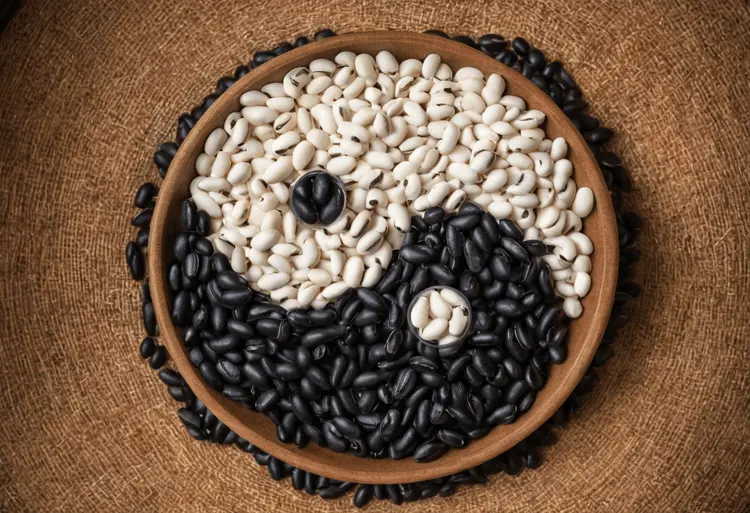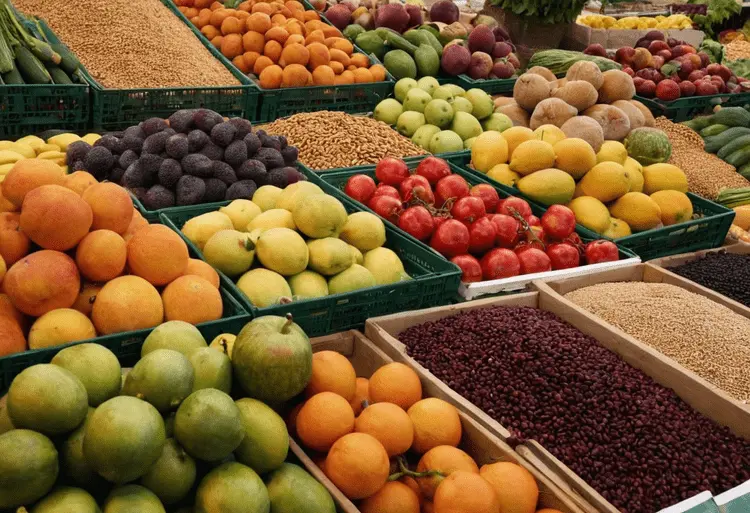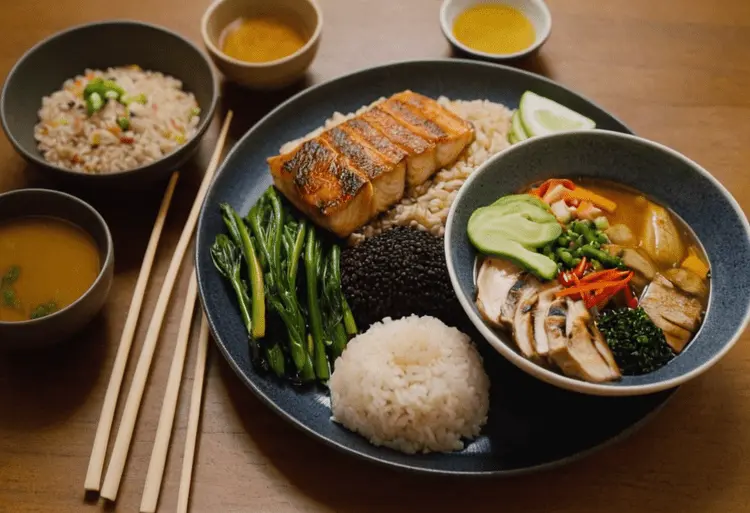The macrobiotic diet could be the answer if you’re tired of fad diets and confusing health trends. Seeking a way to nourish your body and mind holistically?
The constant barrage of conflicting nutrition advice can feel overwhelming. You want a sustainable approach, not a quick fix.
Enter the macrobiotic diet. This ancient approach to eating goes beyond just food. It’s a philosophy of balance inspired by Zen Buddhism, emphasizing whole foods, seasonal produce, and harmony with nature.
Intrigued? This complete guide will delve into the core principles of macrobiotics, the foods it embraces, and the potential benefits of this unique macrobiotic lifestyle.
Macrobiotic Diet: The Short Version
- Whole grains are the foundation
- Emphasizes vegetables and beans
- Prioritizes local, seasonal food
- Rooted in balance philosophy
- Occasional fish allowed
- Seek professional guidance
Table of contents
Introduction

Understanding the Macrobiotic Diet
Have you ever wondered if there’s a way of eating that goes beyond simply counting calories or restricting food groups?
A way of eating that emphasizes a deeper connection to your food and your overall well-being? If so, then the macrobiotic diet might be the answer you’re looking for.
The macrobiotic diet is more than just a list of “approved” foods. It’s a philosophy rooted in ancient wisdom, centered around the balance of yin and yang energies.
This way of eating focuses on whole, unprocessed foods, primarily plant-based, and encourages mindful eating practices.
Potential Benefits of the Macrobiotic Diet
Could shifting to a macrobiotic diet truly improve your health and quality of life? Proponents claim a wide range of benefits, including:
- Improved digestion
- Healthy weight management
- Increased energy levels
- Potential support for those with chronic health conditions
However, consulting with a healthcare professional is essential before embarking on any dietary change, especially when managing a health condition.
The Macrobiotic Approach vs. Other Diets
How does the macrobiotic diet compare to other popular eating patterns like veganism or vegetarianism? While there are similarities in the emphasis on whole plant foods, the macrobiotic diet stands apart due to its underlying philosophy.
It draws inspiration from traditional Chinese medicine principles, with a focus on creating harmony within the body through food choices.
Let me know if you’ve tried a macrobiotic diet, or are curious to explore it further! Have any questions so far? Feel free to share your thoughts in the comments below or tag me on social media.
The macrobiotic diet emphasizes balance and whole foods… but what about a diet built solely on meat and fruit? Prepare to be surprised as we unpack this unconventional and controversial eating pattern.
The Staples of a Macrobiotic Diet
The Grains That Ground You
Think of whole grains as the foundation of your macrobiotic plate! Brown rice, barley, millet, oats, buckwheat…these become your staples. Are you a fan of these hearty flavors or is this a whole new world for you?
Either way, there’s a delicious whole grain discovery waiting for you.
Importantly, the macrobiotic diet emphasizes how you prepare these grains. Soaking, proper cooking – these methods unlock maximum nutrition and make them easier to digest.
Versatile Vegetables
Vegetables are your culinary playground! Focus on seasonal and locally grown produce for the freshest flavors and best synergy with your environment – a core macrobiotic principle. Steaming, lightly sautéing, and even raw preparations add fantastic variety to your meals.
Sea vegetables might be entirely new to your palate. These powerhouses of the ocean offer unique minerals and flavors. If the idea intrigues you, start with small amounts and explore recipes for inspiration.
Think of resources like the National Center for Complementary and Integrative Health on TCM for more insights into how these complement the macrobiotic diet.
Protein Powerhouses
Beans and lentils are your protein superstars in the macrobiotic diet. These satisfying, fiber-rich gems provide the building blocks your body craves. Experiment with different varieties to discover your favorites!
Fish is a bit more controversial within the macrobiotic diet. Traditionally, small amounts of white fish are occasionally included. Whether that’s the right choice for you is a personal decision!
Seasoning & Flavor
The macrobiotic diet favors a simple approach to flavor. Natural, mild seasonings like miso, sea salt, and a touch of ginger enhance the foods without overpowering them. This lets the true essence of your ingredients shine through.
Beyond the Food

It’s a Lifestyle
Think of the macrobiotic diet as more than just what’s on your plate. It’s a mindset, a journey! Do you find yourself rushing through meals, barely tasting what you eat?
Do you feel disconnected from where your food comes from? The macrobiotic diet encourages a whole new relationship with food.
Mindfulness is key. Slow down, savor each bite. Pay attention to how different foods make your body feel. Additionally, regular movement is encouraged – gentle exercise that complements your healthy eating. Yoga, leisurely walks, whatever feels good to you!
Macrobiotic Cooking Considerations
The macrobiotic approach even extends to your kitchen! Specific cookware recommendations are often part of the philosophy.
Think natural materials like cast iron or clay pots – you can find a good discussion on these in a reputable health-focused cookware company blog post. Is avoiding plastic important? Absolutely! Look for glass or stainless steel storage containers instead.
Furthermore, food prep gets special attention. Soaking beans, sprouting grains… these steps make nutrients easier to absorb. It may feel like an adjustment at first, but you’ll find your rhythm (and healthier digestion!).
- Key elements:
- Mindful eating
- Regular exercise
- Specific cookware
- Food preparation techniques
Let’s Chat! Have you tried any of these mindful practices around food? Any surprises? Share in the comments or tag us on social media!
Transitioning into Macrobiotics & Potential Concerns
Finding Balance in Change
Starting a macrobiotic diet can be exciting! But, is a drastic overhaul the best approach? Probably not. Gradual changes are usually more sustainable. Think of it as adding new, nourishing elements instead of rigid restrictions.
Potential Risks and Nutritional Deficiencies
Let’s be real. Any dietary shift has potential downsides. With the macrobiotic diet, getting enough of certain nutrients can be tricky. Calcium, vitamin B12, and iron might need extra attention.
- Is consulting a healthcare professional or a dietician familiar with traditional Chinese medicine principles a smart idea? Absolutely! They’ll help you navigate any potential nutritional gaps.
- You may need to consider supplementation to support overall health.
Real-World Challenges
The macrobiotic diet is a distinct way of eating. Will eating out be a challenge? Sometimes. Will friends and family always understand your choices?
Maybe not at first. Be prepared to explain your reasons, and don’t be afraid to adapt recipes or bring your own delicious creations to social events.
Intrigued by macrobiotics but find it a bit complex? The 90-30-50 Diet Plan delivers a simpler framework for everyday healthy eating and weight management.
Your Path, Guided by Macrobiotics

The macrobiotic diet is more than just food. It’s a framework for a balanced lifestyle, focused on whole, plant-based foods and mindful living. Have you considered how this approach might resonate with your own health goals?
Furthermore, this isn’t a quick fix. True change takes time and commitment. Are you ready to embrace a gradual transition toward more conscious eating?
Think about the potential benefits – improved digestion, balanced energy levels, and perhaps a deeper connection with your food and its origins.
Of course, this journey doesn’t have to be solitary. Seek out guidance from professionals familiar with traditional Chinese medicine principles or qualified nutritionists who understand the macrobiotic diet.
Their insights can help personalize your approach and ensure you’re getting all the nutrients your body needs.
Here are some key takeaways:
- Focus on whole foods: Prioritize whole grains, fresh vegetables, and quality proteins for optimal health and well-being.
- Embrace the philosophy: Understand that this diet aims to restore harmony and balance within your body and its relationship to the environment.
- Seek support: Don’t hesitate to connect with like-minded individuals and qualified practitioners for guidance and community support.
Is the macrobiotic diet the right path for you? Let me know in the comments below! Feel free to share your experiences and tag me on social media – I’d love to hear how your journey progresses.
Please note: While the macrobiotic diet offers potential advantages, it’s always wise to consult with your doctor, especially if you have specific health conditions.
Your Macrobiotic Diet Questions Answered
Think whole grains, fresh vegetables, beans, some fermented foods, and occasionally fish. It emphasizes locally grown, seasonal produce.
Eggs are typically avoided on a strict macrobiotic diet. Focus on plant-based protein sources like beans and lentils.
Coffee is discouraged on this diet as it’s considered a stimulant. Opt for herbal teas or naturally caffeine-free beverages.
It can be! The core of the macrobiotic diet is plant-based. Some variations may include small amounts of fish.
It could! The focus on whole foods and mindful eating can support weight management, but it’s not a magic weight-loss solution.
Always talk to your doctor first! This diet might need adjustments or supplementation to ensure it’s safe for you.
Explore cookbooks, blogs, and websites dedicated to macrobiotics. Many offer delicious recipes and even personalized meal plans.
Both emphasize plant-based eating, but this diet is rooted in traditional philosophies of balance. It may occasionally include small amounts of fish.